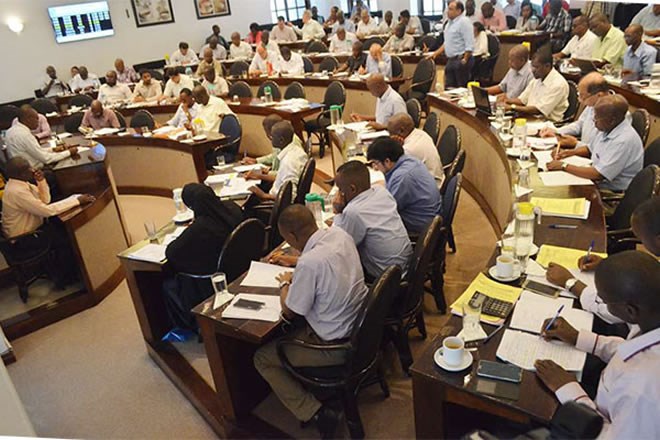
Friday June 19, 2020
By MARTIN MWITA

Traders at the East Africa Tea Trade Auction in Mombasa on Kenya’s Coast. PHOTO FILE | NATION
Tea prices at the Mombasa auction have remained at this year's lowest selling price for a second week running even as traded volumes increased.
Weekly data from the East African Tea Trade Association (EATTA) shows this week, the commodity averaged $1.78 (Sh189.27) a kilo.
This is similar to last week,s price at the traditional Wednesday secondary auction, signaling low future bonus payments for farmers.
The total volume traded was 197,242 kilos more than last week.
The market saw 10,236,627 kilos traded compared to 10,039,385 last week.
Out of 205,005 packages(13,390,000 kilos) available for sale, 155,970 packages (10,236,627 kgs) were sold.
23.91 per cent packages remained unsold, EATTA notes.
“Egyptian Packers were dominant and showed strong support with more and useful interest from Kazakhstan and other CIS nations while Yemen and other Middle Eastern countries lent more activity,”EATTA Managing Director Edward Mudibo said.
Sudan were active while Bazaar showed interest but were selective with reduced participation from Pakistan Packers, UK and Russia, he added.
“There was less support from Afghanistan and were selective with some selective activity from Iran while Somalia were active at the lower end of the market,” he notes.
This is the lowest price this year after trading at above $2 (Sh 212) for the first six weeks of the year, before easing to an average of between $1.82(Sh193.52 )and $1.97 (Sh209 ).
Mudibo is however optimistic the prices will edge up in the near future.
“The prices will correct themselves as the auction moves to the next phase of the season,” he said.
Prices at the Mombasa auction and exchange rate of Kenya shilling to the dollar weigh heavily on final earnings by farmers.
The tea sector is grappling with oversupply owing to prolonged rainfalls in tea growing areas in the country, which affects auction prices and final pay-out to farmers.
The Mombasa Tea Auction is one of the largest in the world where tea from Kenya, Uganda, Rwanda, Tanzania, Malawi, Ethiopia and the Democratic Republic of Congo is traded.
Early this month, Kenya Tea Development Agency announced a Sh649 million pay-out to small scale farmers for their full-year crop delivery to its 54 managed factories.